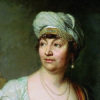Madame de Stael

Madame de Stael
Anne Louise Germaine de Staël-Holstein, commonly known as Madame de Staël, was a French woman of letters of Swiss origin whose lifetime overlapped with the events of the French Revolution and the Napoleonic era. She was one of Napoleon's principal opponents. Celebrated for her conversational eloquence, she participated actively in the political and intellectual life of her times. Her works, both critical and fictional, made their mark on the history of European Romanticism...
NationalityFrench
ProfessionWriter
Date of Birth22 April 1766
CountryFrance
The only equitable manner in my opinion, of judging the character of a man is to examine if there are personal calculations in his conduct; if there are not, we may blame his manner of judging, but we are not the less bound to esteem him.
The most careful reasoning characters are very often the most easily abashed.
The thing that must be preserved in all situations whatever is the reputation of one's character.
One must, so long as there is any life left, back up the character of one's life.
What matters in a character is not whether one holds this or that opinion: what matters is how proudly one upholds it.
Have you not observed that faith is generally strongest in those whose character may be called the weakest?
Conscience is doubtless sufficient to conduct the coldest character into the road of virtue; but enthusiasm is to conscience what honor is to duty; there is in us a superfluity of soul, which it is sweet to consecrate to the beautiful when the good has been accomplished.
We understand death for the first time when he puts his hand upon one whom we love
Prayer is more than meditation. In meditation, the source of strength is one's self. When one prays, he goes to a source of strength greater than his own.
Wit consists in knowing the resemblance of things that differ, and the difference of things that are alike.
When a noble life has prepared for old age, it is not decline that it reveals, but the first days of immortality.
Love is the emplem of eternity; it confounds all notions of time; effaces all memory of begining, all fear of an end.
[Moralistic] novels are at the same disadvantage as teachers: children never believe them, because they make everything that happens relate to the lesson at hand.
How true it is that, sooner or later, the' most rebellious must bow beneath the yoke of misfortune!